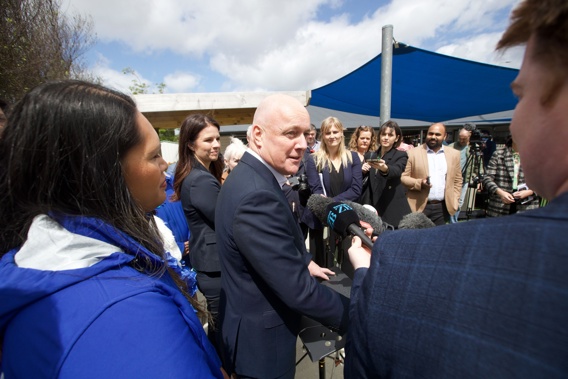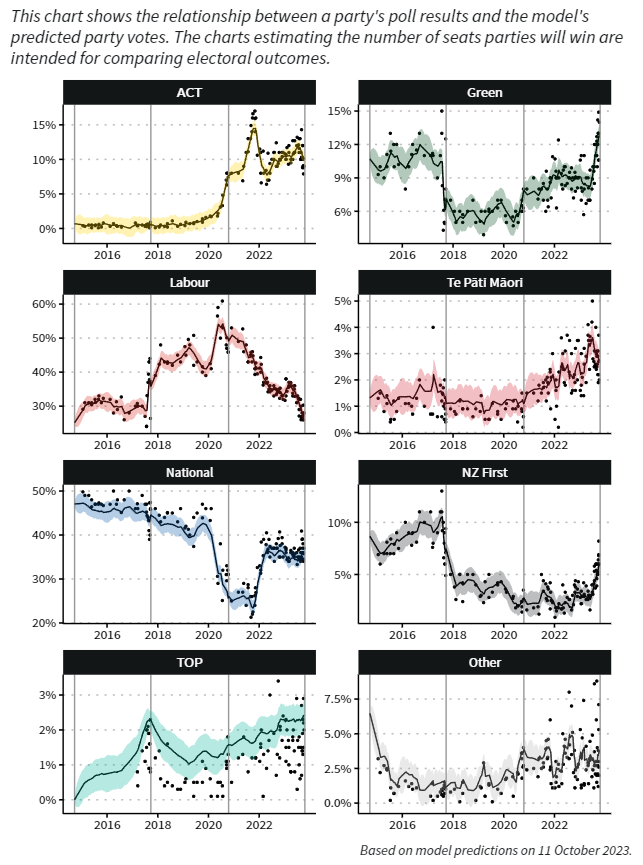

The final push for votes has seen a heated exchange on the campaign trail with police stepping in to remove a man shouting at Chris Hipkins.
Both Labour leader Hipkins and National leader Christopher Luxon have been campaigning in Auckland today, ahead of tonight’s TVNZ leaders’ debate.
Earlier in the day Hipkins cast his vote at the Mangere Arts Centre, where a man then started shouting obscenities at him.
The man was taken aside by two police officers, with whom he continued an aggressive conversation long after Hipkins had left.
Before the outburst - and before he cast his vote - Hipkins optimistically told reporters ‘the late surge is on’.
It comes as the NZ Herald’s final Poll of Polls shows the left bloc has no realistic path to power, and National and Act are likely going to need NZ First to form a Government.
There is a 99.8 per cent chance of National, Act, and NZ First being able to form a government after the election. Take NZ First away and National and Act have just a 28.5 per cent chance of getting over the line.
The Poll of Polls still thinks there is a 0 per cent chance of Labour, the Greens, and Te Pāti Māori getting over the line, with the slight surge in the left bloc’s support failing to register.
STORY CONTINUES AFTER LIVEBLOG
STORY CONTINUES
The Poll of Polls usually runs two simulations: one for likely results if the election were held on the coming Saturday, and another modelling the election for the actual date: October 14. Given polling day is this weekend, the Poll of Polls only ran one simulation for its last edition. It simulates polls based on recent polling data. This final simulation includes data from last night’s 1 News Verian and Newshub Reid Research polls.
Both polls showed National and Act will struggle to get over the line without the support of NZ First and Winston Peters.
The Poll of Polls thinks Labour is likely to get 26.8 per cent, while National would get 35.5, the Greens are likely to poll 12.4 per cent, and Act is likely to get 11 per cent.
It has Te Pāti Māori getting 2.6 per cent and TOP 2.1 per cent.
How the Poll of Polls works
As part of its 2023 election coverage, the Herald has launched its Poll of Polls, which combines polling from different pollsters to predict the party vote for the 2023 election.
The model imagines that in any given week there exists an unobserved voting intention that is partially measured via opinion polls and is accurately measured once every three years by an election.
The model can also make predictions about how voting intentions can evolve between now and election day.
This approach enables us to estimate each polling organisation’s accuracy in previous elections and then use that to inform our predictions.
The Herald has based its model on a New Zealand election forecast developed by statistician and data scientist Peter Ellis. Ellis developed the model in a private capacity prior to taking on his current role as director of the Statistics for Development Division at the Pacific Community (SPC).
Voting intention in the 2017, 2020, and 2023 elections
Vertical lines indicate elections, points show poll results. Shaded area indicates the estimated voting intention for a party.

Ellis also used the model to forecast the Australian election. Similar models have been used to make predictions about the German and Swedish elections. Both Germany and Sweden have proportional representation electoral systems similar to New Zealand’s MMP system.
Our Poll of Polls combines results from a range of pollsters, who are signatories to the New Zealand Political Polling Code, specifically Curia, Kantar Public, Talbot Mills, and Reid Research.
Details of the model, including the source code, are available here. Between now and the election, we will be looking to improve some aspects of the model, in particular the handling of polls which do not provide polling data for some of the smaller parties.
Currently, in order to be included in the model, a party must have polled over 2.5 per cent in at least three polls.
It is assumed that parties currently holding an electorate seat retain them and no other parties win an electorate seat. Future versions will enable readers to modify this assumption.
Thomas Coughlan is Deputy Political Editor and covers politics from Parliament. He has worked for the Herald since 2021 and has worked in the press gallery since 2018.
Take your Radio, Podcasts and Music with you









